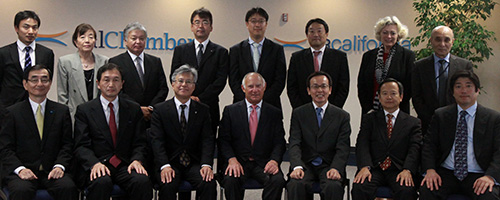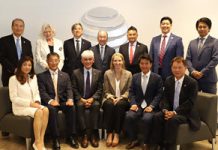An annual meeting between the California Chamber of Commerce and Japan business leaders highlighted California’s continuing interdependence with one of its largest export partners.
Leading the Japanese business delegation were Hitoshi Yamamuro, president of the Japanese Chamber of Commerce of Northern California (JCCNC), and Hideo Miyake, president of the Japan Business Association of Southern California (JBA).
Representing the CalChamber at the luncheon were Allan Zaremberg, president and CEO, and Susanne T. Stirling, vice president, international affairs.
Memorandum of Cooperation
On September 5, 2014, the State of California and the government of Japan signed a Memorandum of Cooperation (MOC) to support California’s efforts on fighting climate change and protecting the environment by sharing the intention to cooperate in the following areas:
- Climate change;
- Renewable energy;
- Energy storage;
- Trade and investment;
- Vehicles, particularly zero emission vehicles (ZEVs);
- Joint engagement with cities, sister agencies, non-governmental organizations, academia and the private sector;
- Cooperation on possible demonstration projects on the effectiveness of SC fast charging and enhanced EV use;
- High-speed rail (HSR) and other passenger rail services;
- Water conservation and management; and
- Any other activities mutually decided by both sides.
Under this MOC, the Governor’s Office of Business and Economic Development (GO-Biz) and the Japanese government New Energy and Industrial Technology Development Organization (NEDO) signed a Memorandum of Understanding to cooperate in promoting zero-emission electric vehicles. The parties agree that their relationship, collaboration and sharing interest will help achieve California’s Renewable Portfolio standard (50% renewable energy by 2030.)
Japanese Investment, Expansion in California
Japan is the biggest foreign investing country in California with 24.2% of overall foreign direct investment. Japanese firms have 137,669 employees in California. According to the report prepared by JCCNC and JBA in conjunction with their annual visit to Sacramento, nearly 96% of those employees are hired locally. The average salary for employees in Japanese firms is $85,000, which adds up to $11 billion in annual payroll.
After the financial crisis in 2008, the number of Japanese companies in Southern California decreased approximately 43%. In Northern California, however, the number has been slowly but continuously increasing since 2010, due to Silicon Valley’s booming economy.
The proportion of the types of Japanese firms differs between Northern and Southern California. The highest percentage industry in Northern California is service companies, while manufacturing companies are more prevalent in Southern California.
Notable Statistics

As of 2014, 18.6% of total U.S. export goods to Japan, mainly high-tech equipment and agricultural products, are from California.
Japan is California’s third largest import partner and fourth largest export partner.
According to the JCCNC/JBA report:
- As of the end of 2014 there were 1,392 Japanese-affiliated companies operating in California. The top three industry categories were services, manufacturing and wholesale/retail.
- Last year, the number of Japanese firms in Northern California reached a high point for the last six years; the number of firms is expected to surpass 800 in 2015.
- As of 2014, more Japanese firms reside in Northern California (719) than Southern California (673).
Business Challenges
According to the survey, the top two concerns about pursuing business in California are high labor costs (70.4%) and high tax rate (44.8%).
Looking Forward
Japan’s Prime Minister Abe visited California this spring. During his visit, he introduced the Kakehashi (bridge) Project to connect Japan and Silicon Valley by sending young professionals and entrepreneurs to Silicon Valley to learn the process of innovations. With the MOC and Kakehashi Project, the associations “see a bright future for Japanese companies and professionals in California to expand their abilities.”
The JCCNC was established as a nonprofit corporation in 1951 to promote business, mutual understanding and good will between Japan and the United States.
JBA, founded in 1961, is a nonprofit organization consisting of nearly 450 Japanese corporations doing business across Southern California.

